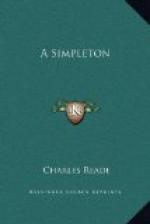He sent an account of Lord Ayscough’s case to a medical magazine: and so full is the world of flunkeyism, that this article, though he withheld the name, retaining only the title, got the literary wedge in for him at once: and in due course he became a paid contributor to two medical organs, and used to study and write more, and indent the little stone yard less than heretofore.
It was about this time circumstances made him acquainted with Phoebe Dale. Her intermediate history I will dispose of in fewer words than it deserves. Her ruin, Mr. Reginald Falcon, was dismissed from his club, for marking high cards on the back with his nail. This stopped his remaining resource—borrowing: so he got more and more out at elbows, till at last he came down to hanging about billiard-rooms, and making a little money by concealing his game; from that, however, he rose to be a marker.
Having culminated to that, he wrote and proposed marriage to Miss Dale, in a charming letter: she showed it to her father with pride.
Now, if his vanity, his disloyalty, his falsehood, his ingratitude, and his other virtues had not stood in the way, he would have done this three years ago, and been jumped at.
But the offer came too late; not for Phoebe—she would have taken him in a moment—but for her friends. A baited hook is one thing, a bare hook is another. Farmer Dale had long discovered where Phoebe’s money went: he said not a word to her; but went up to town like a shot; found Falcon out, and told him he mustn’t think to eat his daughter’s bread. She should marry a man that could make a decent livelihood; and if she was to run away with him, why they’d starve together. The farmer was resolute, and spoke very loud, like one that expects opposition, and comes prepared to quarrel. Instead of that, this artful rogue addressed him with deep respect and an affected veneration, that quite puzzled the old man; acquiesced in every word, expressed contrition for his past misdeeds, and told the farmer he had quite determined to labor with his hands. “You know, farmer,” said he, “I am not the only gentleman who has come to that in the present day. Now, all my friends that have seen my sketches, assure me I am a born painter; and a painter I’ll be—for love of Phoebe.”
The farmer made a wry face. “Painter! that is a sorry sort of a trade.”
“You are mistaken. It’s the best trade going. There are gentlemen making their thousands a year by it.”
“Not in our parts, there bain’t. Stop a bit. What be ye going to paint, sir? Housen, or folk?”
“Oh, hang it, not houses. Figures, landscapes.”
“Well, ye might just make shift to live at it, I suppose, with here and there a signboard. They are the best paid, our way: but, Lord bless ye, they wants headpiece. Well, sir, let me see your work. Then we’ll talk further.”
“I’ll go to work this afternoon,” said Falcon eagerly; then with affected surprise, “Bless me; I forgot. I have no palette, no canvas, no colors. You couldn’t lend me a couple of sovereigns to buy them, could you?”




